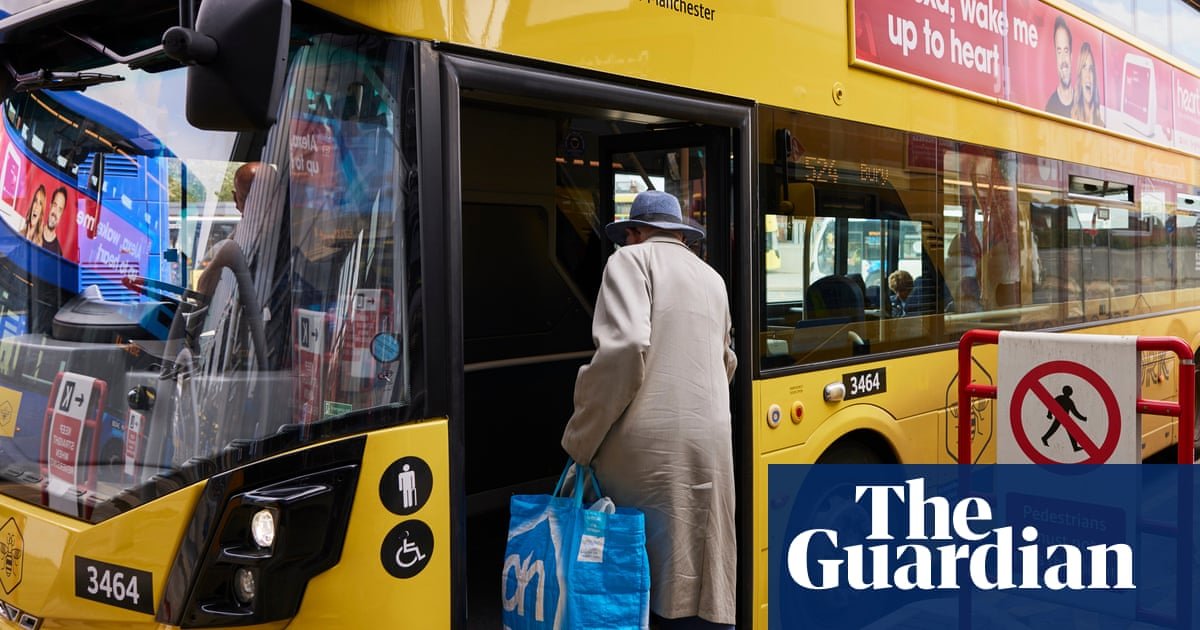Business
People lacking good public transport more likely to feel lonely, UK study finds | Public transport

People who depend on cars to get around are more likely to feel lonely and disconnected than those who have access to good public transport, a UK study has found.
Analysing official statistics on loneliness and transport usage, researchers said there was a clear correlation between people without decent transport alternatives and those who describe themselves as feeling left out or without companionship.
According to the findings from the Social Market Foundation (SMF), based on Department for Transport data, the trend appeared across Britain and was statistically significant in all but one region.
Car dependency had the highest impact on loneliness in rural towns, the thinktank found, and the least in cities, where people are more likely to have reliable alternatives in terms of train, buses, trams, walking or cycling.
A report last year for the DfT concluded that most people were “no more or less likely to be lonely if they used public transport or not”, with an exception for those with health conditions that stopped them driving.
However, by cross-referencing the data with that from another major study, the DfT’s national travel survey, the SMF concluded that when people were dissatisfied with their public transport, they were more likely to also be lonely.
The thinktank said: “Our first-of-its-kind analysis shows a very clear and statistically significant link between car dependency and loneliness, with results indicating that loneliness increases by 5% for every 20% fall in satisfaction with public transport and active travel. Put another way, failing to provide alternatives to cars is making people more lonely and more isolated.”
The report says the correlation was found across every region of the country, but car dependency was shown to have the highest impact on loneliness in rural towns.
Gideon Salutin, a senior researcher at the SMF, said the study showed that people in car-dependent areas were lonelier even if they were able to drive. Among possible explanation for the link was that people had “fewer ways to reach others, cutting them off from job sites, pubs and other social spaces”.
“It might also be that the infrastructure we build to support motoring builds more barriers in what might have been walkable neighbourhoods and green spaces,” he said. “Given that driving tends to poorly affect stress and health, it’s also possible that it leaves people more vulnerable to loneliness and isolation. Driving also means you can’t drink, which can be an exclusionary factor in many social settings.”
Salutin said that while the data did not show that cars themselves caused loneliness, a recent US academic study had found that relying on a car more than 50% of the time was associated with a decrease in life satisfaction.
A number of UK thinktanks and charities have expressed concern about increased car dependency in new housing estates, as well as the decline in rural bus routes.
A report by the New Economics Foundation in 2024 said newbuilds across Britain were leading to ever more car dependency, relative to existing homes.
Steve Chambers, the director of Transport for New Homes, said: “It’s not surprising to learn that people are lonely. When we visit housing estates, it’s very rare that we see many people outside at all. When they leave the house, they have to get in their car – there are very few trips that are possible on foot.”
He said examples such as Derwenthorpe, on the edge of York, built around walking and cycling with open spaces and people interacting, were few. “That vibrancy of life is in really stark contrast to many places where people have no reason to set foot outside their home, bar maybe to wash their car.”
Business
UK agrees £10bn deal to supply Norway with warships

The UK and Norway have agreed a £10bn deal under which Britain will supply the Norwegian navy with at least five new warships.
The agreement involving Type 26 frigates will be the UK’s “biggest ever warship export deal by value”, the Ministry of Defence (MoD) said, while Norway said it would be its largest “defence capability investment” to date.
The government said the deal would support 4,000 UK jobs “well into the 2030s”, including more than 2,000 at BAE Systems’ Glasgow shipyards where the frigates will be built.
UK Prime Minister Sir Keir Starmer said the agreement would “drive growth and protect national security for working people”.
“This success is testament to the thousands of people across the country who are not just delivering this next generation capabilities for our Armed Forces but also national security for the UK, our Norwegian partners and Nato for years to come,” he added.
The deal is also expected to support more than 400 British businesses, including 103 in Scotland, the MoD said.
The agreement represents a victory for the British government and defence industry over France, Germany and the United States – which were also being considered by Norway as possible vendors.
It will create a combined UK-Norwegian fleet of 13 anti-submarine frigates – eight British and five Norwegian vessels – to operate jointly in northern Europe, significantly strengthening Nato’s northern flank.
The warships will be constructed at the BAE systems yard in the Govan area of Glasgow, where frigates for the Royal Navy are currently being built.
Scottish Secretary Ian Murray said the choice of the UK “demonstrates the tremendous success of our shipbuilding industry and showcases the world-class skills and expertise of our workforce on the Clyde”.
Norway’s Prime Minister Jonas Gahr Støre, who informed Sir Keir of the decision to select the UK in a phone call on Saturday night, said the partnership “represents a historic strengthening of the defence cooperation between our two countries”.
Støre said the government had weighed two questions in its decision: “Who is our most strategic partner? And who has delivered the best frigates?… The answer to both is the United Kingdom.”
The Type 26 frigates purchased by the Royal Norwegian Navy will be as similar as possible to those used by their British counterparts, and have the same technical specifications.
They are specifically designed to detect and track enemy submarines and engage them in combat if necessary, with deliveries are expected to begin in 2030.
UK Defence Secretary John Healey said: “For over 75 years, Britain and Norway have stood together on Nato’s northern and north-eastern frontiers, keeping the UK and Europe safe. This historic defence deal deepens our strategic partnership.
“With Norway, we will train, operate, deter, and – if necessary – fight together.
“Our navies will work as one, leading the way in Nato, with this deal putting more world-class warships in the North Atlantic to hunt Russian submarines, protect our critical infrastructure, and keep both our nations secure.”
Business
First the great migration, now the big hold: why workers are staying put | US small business

The tide has turned. The great migration – when the shift to remote work prompted people to quit their jobs in droves – is officially over. Now comes the big hold.
According to a new survey from consulting firm Robert Half, 73% of respondents – workers at companies – said they plan to stay in their current roles through 2025. They gave reasons like having “positive company culture” and “feeling professionally fulfilled” or “being well compensated” at their current job. But there’s also a fourth reason why so many are staying put: the job market isn’t great and people are worried.
Job growth is significantly down. Job openings fell again to under 7.5m last month, a level that’s 4m below the openings available back in 2022. Wage gains during that same period had fallen from 6.7% to 4.1%.
Microsoft, AT&T, JP Morgan, Amazon and other companies are mandating their employees to return to their offices or lose their jobs. AI is already replacing workers at tech companies, Wall Street firms and retailers and some fear greater job losses in the not too distant future. Other cost cutting measures are leading big brands like Citi, Accenture, Tesla and Intel and other corporate giants to lay off tens of thousands of workers.
And what a great opportunity for small businesses!
For example, there’s my friend in Illinois. He has over 100 employees in his office. For years, he’s been spending half his days just walking around and talking to them. Telling them how important they are. Checking in on their lives and families. Asking them what they’re doing and what problems they’re having. Imagine working for that guy. Someone who genuinely cares about his workers. His turnover’s low. His retention is high.
Or another client of mine in Pennsylvania who allocates a big piece of his operating budget every year to employee technical training. Fear AI? “No way”, he tells me. “I want my people to embrace it! They need to learn about all the AI features in our software applications so that they can not only get more work done for me during the day but have a more balanced life themselves.” Did I mention that he gets workforce development money from his state that pays for this extra training? Now you know.
Another client of mine gives employees a $1,000 educational “credit” to use however they want. “They can learn origami or take a knitting class for all I care,” she said to me. “Becoming a better person makes you a better worker too.” Not coincidentally, she also enjoys the tax deductions allowed for providing this benefit.
There are other tax benefits that small business owners can use to recruit and retain all this available talent for healthcare, childcare, for hiring workers who were formerly incarcerated, off welfare or out of the military.
In the midst of all this job chaos, small business hiring and employment has remained constant. The latest Small Business Employment Watch report from Paychex, the giant HR and payroll processing firm, found that in July hiring among those companies with less than 50 employees “remained steady” which, according to the company’s CEO “speaks to the resiliency of small businesses given the amount of uncertainty they faced so far this year”.
Ever since I can remember my small business clients have complained about competing with big companies and the government for talent. Well, now the tide has turned. Big companies are laying off people by the tens of thousands. Governments are cutting their headcounts. The labor market is softening. But small businesses – who already employ half of this country’s workers – are still hiring and always looking for talent. The softening job market is a great opportunity for them. And for many workers.
Business
Wytham Abbey’s asking price slashed by 60% after failure to find buyer | Property

Wytham Abbey, a 15th-century grade I-listed manor that was once planned as a hub for technologists and philosophers to solve some of the world’s toughest problems, has had its sale price slashed by 60% to £5.95m as its charity owners struggle to find a buyer.
The Effective Ventures Foundation (EVF), formerly the Centre for Effective Altruism, bought the 27-bedroom, 18-bathroom Oxfordshire estate in April 2022.
Backed by the Facebook co-founder Dustin Moskovitz’s Open Philanthropy fund, EVF envisioned the property as a hub for global thinkers combining effective altruism and artificial intelligence to “benefit others as much as possible”.
But it was forced to put the manor and extensive grounds up for sale for £15m last year after its backers withdrew support for the events venue.
The property portal Rightmove said it was one of its five most-viewed homes of 2024 but with no sale agreed the asking price was reduced to £12m in June. It was cut again in August with the UK’s luxury property market struggling amid cooling interest from the world’s super rich and Labour’s tax changes.
EVF said: “As part of its ongoing effort to maximise sale proceeds directed to high-impact charities, Effective Ventures has taken advice from leading surveyors and decided to lower the property’s guide price to encourage offers from actively interested prospective buyers.”
Savills, the agency marketing the property, declined to comment.
Over its six centuries, the abbey has welcomed an eclectic list of guests, from Queen Elizabeth I, Oliver Cromwell and Queen Victoria to Skype’s billionaire investor, Jaan Tallinn, and the jailed FTX founder, Sam Bankman-Fried. FTX was an EVF backer before its collapse.
Set in 9 hectare (23 acres) of grounds and parkland and built around 1480 from locally quarried limestone, it retains Tudor arched doorways. The Earl of Abingdon lavished money on improvements in the 18th century, adding to its grandeur. It has eight reception rooms, a Georgian-oak staircase, stained glass panels and a marble fireplace.
after newsletter promotion
At the time of its decision to sell the property, an EV spokesperson said: “Effective Ventures agreed with the abbey’s major donors at the time of the original purchase that they could recommend that EV sells the property if they believed there were higher-impact uses of the asset.”
EVF’s parent group, Effective Ventures, repaid nearly $27m (£20m) last year to the FTX estate – equal to all the funds it received from entities linked to Bankman-Fried. He was sentenced to 25 years in prison in March 2024 for defrauding customers and investors of his crypto empire, which collapsed into bankruptcy from a valuation of $32bn.
-
Tools & Platforms3 weeks ago
Building Trust in Military AI Starts with Opening the Black Box – War on the Rocks
-

 Ethics & Policy1 month ago
Ethics & Policy1 month agoSDAIA Supports Saudi Arabia’s Leadership in Shaping Global AI Ethics, Policy, and Research – وكالة الأنباء السعودية
-

 Business2 days ago
Business2 days agoThe Guardian view on Trump and the Fed: independence is no substitute for accountability | Editorial
-

 Events & Conferences3 months ago
Events & Conferences3 months agoJourney to 1000 models: Scaling Instagram’s recommendation system
-

 Jobs & Careers2 months ago
Jobs & Careers2 months agoMumbai-based Perplexity Alternative Has 60k+ Users Without Funding
-

 Funding & Business2 months ago
Funding & Business2 months agoKayak and Expedia race to build AI travel agents that turn social posts into itineraries
-

 Education2 months ago
Education2 months agoVEX Robotics launches AI-powered classroom robotics system
-

 Podcasts & Talks2 months ago
Podcasts & Talks2 months agoHappy 4th of July! 🎆 Made with Veo 3 in Gemini
-

 Podcasts & Talks2 months ago
Podcasts & Talks2 months agoOpenAI 🤝 @teamganassi
-

 Mergers & Acquisitions2 months ago
Mergers & Acquisitions2 months agoDonald Trump suggests US government review subsidies to Elon Musk’s companies

